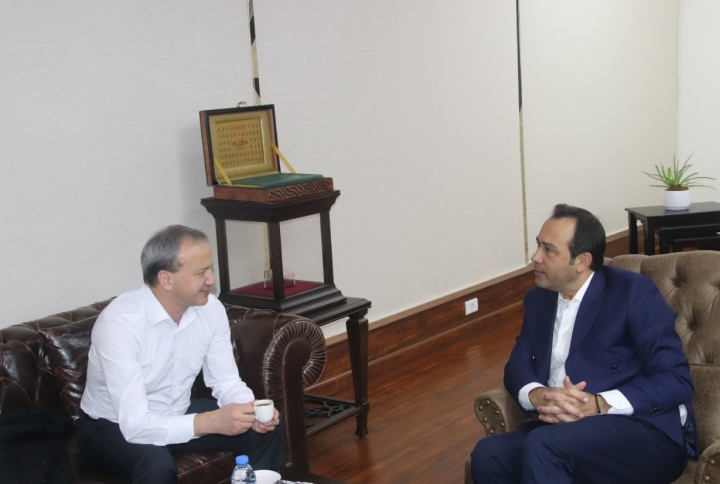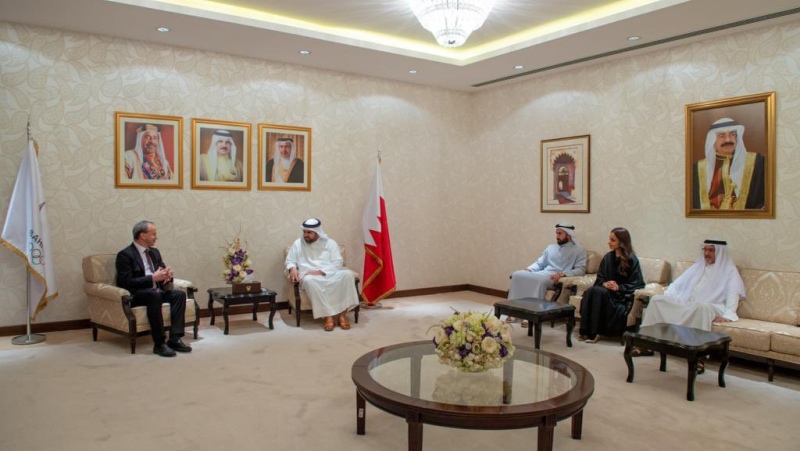This week, the President of the International Chess Federation, Arkady Dvorkovich, held several high-level meetings in the Middle East before joining the rest of the team in Jerusalem for the Q4 FIDE Council Meeting.
The first stop was Bahrain, on November 22, where Dvorkovich met with the Vice-President of the Bahrain Olympic Committee, his Highness Shaikh Isa Bin Ali bin Khalifa Al Khalifa, the Secretary-General Mr Faris Al Kooheji, and the Board Member Dr Shaikha Hessa bint Khalid Al Khalifa.
Two of the main topics of the discussion were possibly holding some top FIDE events in Bahrein, as well as the inclusion of chess into the regional games. The third edition of the Gulf Games was held this year in Kuwait, and the next one, in 2026, will see the participation of 10 countries from the region. The Bahrain Chess Federation is a member of the National Olympic Committee, as well as a member of FIDE since 1982, and the island currently has 570 rated players. The last top-level chess event held in Bahrain was the exhibition match between Vladimir Kramnik and Deep Fritz in 2002.
The FIDE president also met with His Highness Aymen Al Moayed, Minister of Youth and Sports, and since this week, Supreme Council for Youth & Sports Secretary General. The Minister demonstrated a great interest in creating a technification centre or academy in Bahrain offering high-level training to young talents from the region.
The next stop was Beirut, where the Deputy Chair of the Management Board, Dana Reizniece-Ozola, and the Chairman of the Trainers Commission, Sami Khader, joined the FIDE President. The host was the President of the Lebanon Federation, Khaled Badieh, who prepared a packed agenda of visits and high-level meetings.

With Minister of Youth and Sports, George Kallas
November 23 started with a meeting with George Kallas, Minister of Youth and Sports for Lebanon (pictured above, left), followed by a meeting with the Vice President of the Olympic Committee, Mr Jack Tamer, and its Secretary General, Mr Hassan Rostom.
After a break, the round of meetings continued in the afternoon, where the FIDE delegation had the chance to meet with the Minister of Culture, Mr Muhammad Wissam Adnan Murtada, the Minister of Education, Abbas Halabi, and the Secretary General of the Council of Ministers, Mr Mahmoud Makiya.

Most of these top-level meetings follow a similar script: the possibility of hosting a FIDE event is usually accompanied by a proposal to create a plan to train and develop local talents, so the best players in the country can make the most of the opportunity. This way, the host can ensure that the investment in the event has a long-lasting effect. Then, the authorities receive a comprehensive explanation of why chess is such a formidable tool for education, and they are presented with some examples of social projects developed by FIDE. In the case of Lebanon, the chess in prisons project, and the possibility of including chess in cultural sites and as a part of cultural festivals, were two of the ideas that resounded the most among our hosts.

With the Lebanese Minister of Education, Mr Abbas Halabi
“I am very satisfied with the visit of THE FIDE President”, said the President of the Lebanon Chess Federation, Khaled Badieh. “It is of great help since it opens doors to the government and provides guidance. The Federation will do its best to follow up on the initiatives discussed and deliver”, he added.
FIDE had signed a Memorandum of Understanding with the Lebanese Ministry of Education back in 2010, but the results were quite modest. While chess has a strong presence at universities, where it is very well considered, chess in school activities are scattered and lack coordination and support. “There is a vibrant chess life in Lebanon, but scattered. I would be happy if our meetings with government officials and representatives of the chess community could help to enhance their cooperation for the benefit of professional chess players, but most importantly, to engage even more kids in schools and chess clubs”, said Arkady Dvorkovich.
Lebanon currently has 1800 registered players, 290 of which are FIDE-rated. “Before the arrival of the President, I had the chance to visit visiting schools and chess clubs. What pleased me the most was seeing many young players and girls among the members”, says Dana Reizniece-Ozola. “Many of these clubs are self-organised, quite a few were created during the pandemic, and they act like the local community clubs: people gather there to play chess but also to socialise, connect, and spend some quality time together”, she added.

With Lebanon Olympic Committee
One last meeting before leaving Beirut was held between Dvorkovich and Dr Nabil Badr. A prominent business figure in Lebanon, Mr Badr is also a member of the Parliament, and he has been President of the Lebanese and Mediterranean chess federations.

Arkady Dvorkovich and Dr. Nabil Badr, former President of the Lebanese Chess Federation







